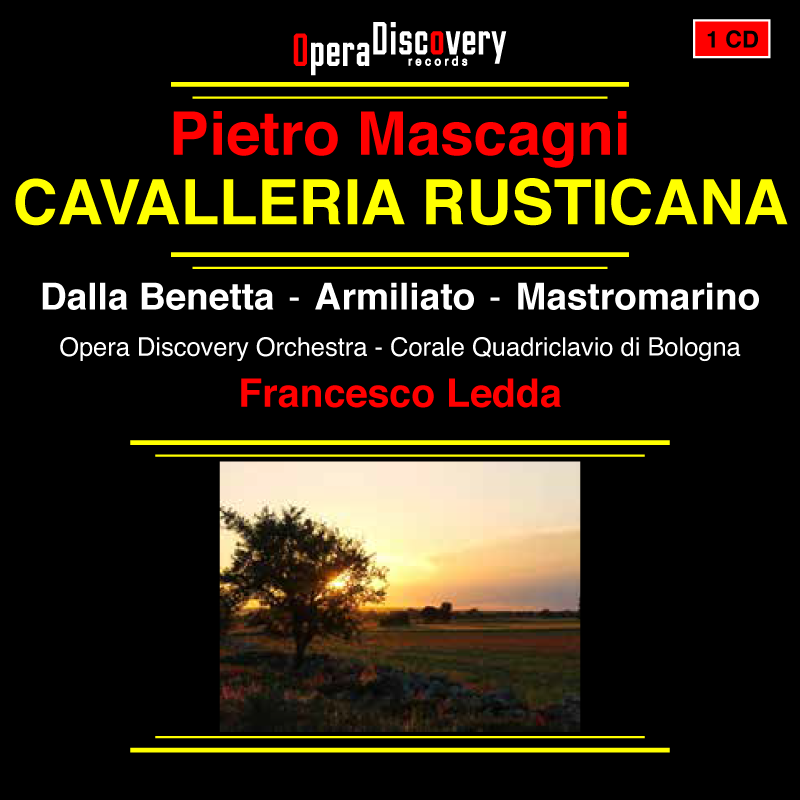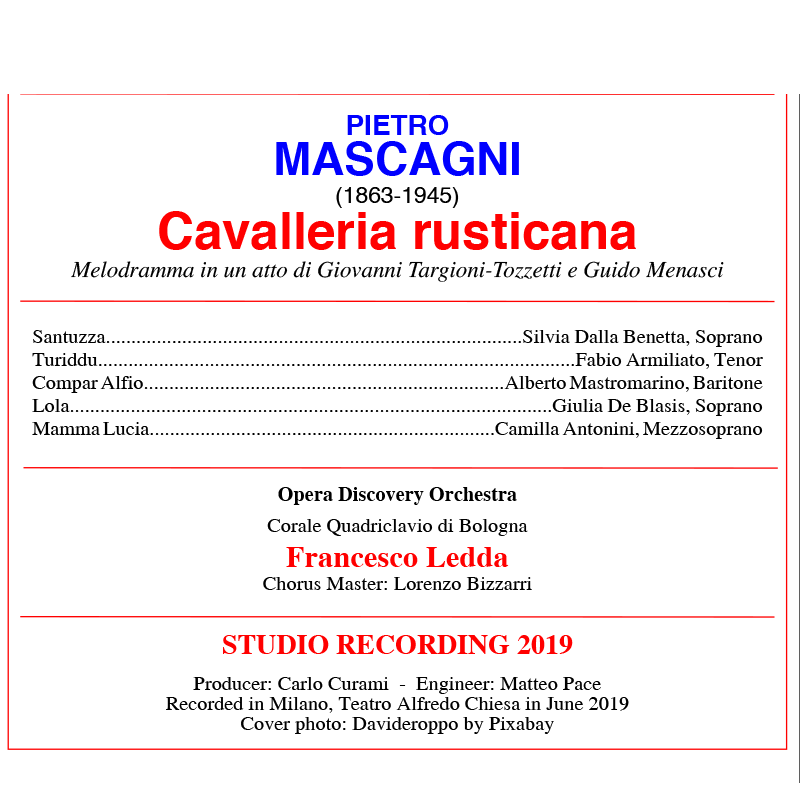Pietro Mascagni
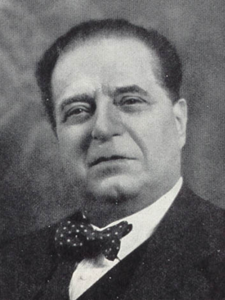
Pietro Mascagni
Pietro Mascagni was born in Livorno the December 7, 1863 and followed his musical vocation against his father’s wishes. His first compositions won him financial support to study at the Milan Conservatory. He left in 1885 before graduating to work as a conductor with Dario Acconci’s touring company, which had staged his operetta Il re a Napoli earlier that year. He settled in Cerignola in 1886 to work as a teacher. In 1888 he won the Sonzogno Competition with Cavalleria rusticana. The opera’s premiere in 1890 was a tremendous success, which Mascagni built on the following year with L’amico Fritz. He became increasingly prominent as a conductor and in 1892 conducted his opera I Rantzau around Europe. He was director of the Liceo Musicale in Pesaro 1885–1902. Further operas included Guglielmo Ratcliff (1895), Silvano (1895), Zanetto (1896), Iris (1898), Le maschere (1901), Amica (1905), Isabeau (1911), Parisina (1913), Lodoletta (1917), Il piccolo Marat (1921), Pinotta (1932) and Nerone (1935). In 1915 he experimented with writing for cinema in Rapsodia satanica with Nino Oxilia. He composed also sacred music (Messa di Gloria, 1888), symphonic music and many chamber music for voices and instruments. Pietro Mascagni died in Rome the August 2, 1945.
Giovanni Targioni-Tozzetti
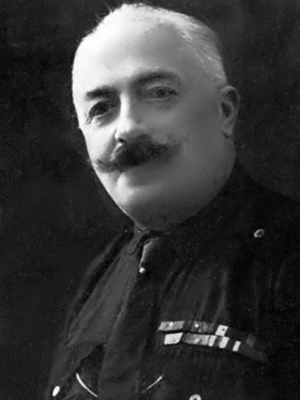
Giovanni Targioni–Tozzetti
Giovanni Targioni-Tozzetti was born il Livorno the March 17, 1863 and was a librettist, best known for his friendship and collaboration with Pietro Mascagni. He wrote for him the libretto of: Cavalleria rusticana, I Rantzau, Silvano, Zanetto, Pinotta and Nerone. Targioni-Tozzetti’s other works included the first Italian translation of Massenet’s Werther and of Mascagni’s only French-language opera, Amica. For Umberto Giordano he wrote the libretto of Regina Diaz. He died in Livorno the May 30, 1934.
Guido Menasci
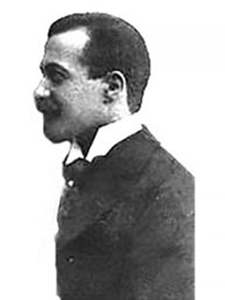
Guido Menasci
Guido Menasci was born il Livorno the March 24, 1867 and was a librettist, regular collaborator with Giovanni Targioni-Tozzetti on Cavalleria rusticana, I Rantzau and Zanetto for Mascagni and Regina Diaz for Umberto Giordano. For August Scharrer he wrote the libretto of Redenzione and for Ignaz Brüll he wrote Gloria. He died in Livorno the December 26, 1925.
Cavalleria Rusticana
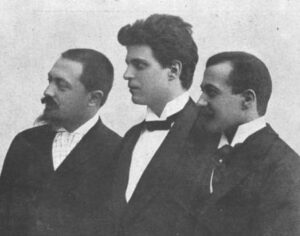
Pietro Mascagni with Giovanni Targioni-Tozzetti and Guido Menasci
In July 1888 the music publisher Edoardo Sonzogno announced a competition open to all young Italian composers who had not yet had an opera performed on stage. They were invited to submit a one-act opera which would be judged by a jury of five prominent Italian critics and composers. The best three would be staged in Rome at Sonzogno’s expense. Mascagni heard about the competition only two months before the closing date and asked his friend Giovanni Targioni-Tozzetti, a poet and professor of literature at the Italian Royal Naval Academy in Livorno, to provide a libretto. Targioni-Tozzetti chose Cavalleria rusticana, a popular short story (and play) by Giovanni Verga, as the basis for the opera. He and his colleague Guido Menasci set about composing the libretto, sending it to Mascagni in fragments, sometimes only a few verses at a time on the back of a postcard. The opera was finally submitted on the last day that entries would be accepted.
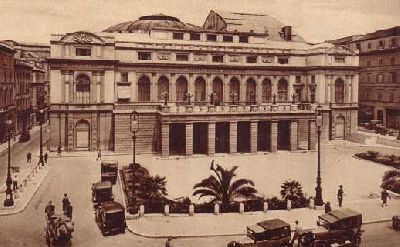
The Teatro Costanzi in Rome
In all, 73 operas were submitted, and on 5 March 1890, the judges selected the final three: Niccola Spinelli’s Labilia, Vincenzo Ferroni’s Rudello, and Mascagni’s Cavalleria rusticana. Cavalleria rusticana won and opened on the evening of 17 May 1890 at the Teatro Costanzi in Rome with Gemma Bellincioni as Santuzza and Roberto Stagno as Turiddu and the orchestra conduced by Lepoldo Mugnone. It was a sensation, with Mascagni taking 40 curtain calls and winning the First Prize.
Synopsys
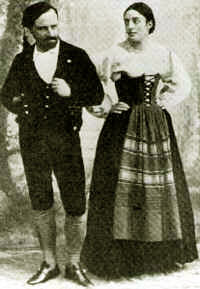
Roberto Stagno and Gemma Bellincioni
A village in Sicily, XIX Century
Easter morning Turiddu serenades Lola, with whomhe has re-established contact. The village inhabitants are happy because it is spring. Driven by a feeling of anxiety, Santuzza looks for Turiddu at his mother Lucia tavern on the village square. Alfio, who was away on business, returns and sings about his wifes fidelity. Santuzza remains outside the church. She suspects that Turiddu is unfaithful and confides her sorrows to his mother. He is taken to task, but he resorts to excuses.
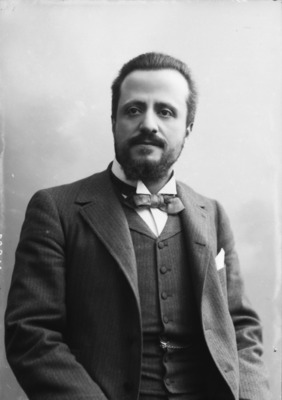
Leopoldo Mugnone
However, as Lola passes by, he forgets Santuzza and her accusations and pushes her away. Santuzza curses him. Deeply wounded and with hurt pride, she reveals to Alfio the adulterous relationship his wife has with Turiddu. In a rage, Alfio swears to seek revenge. When the church service is over, Turiddu invites everyone to join him in a traditional drink. He also offers Alfio a glass. Alfio refuses rudely. Turiddu realizes that Alfio knows about the adultry. They challenge each other according to a sicilian ritual (a bite in the ear). Fear of death rises in Turiddu and he begs his mother for her blessing. He asks her to protect Santuzza. Then he goesto the agreed meeting place for the duel. The cry Turiddu has been murdered ends the tragedy.

